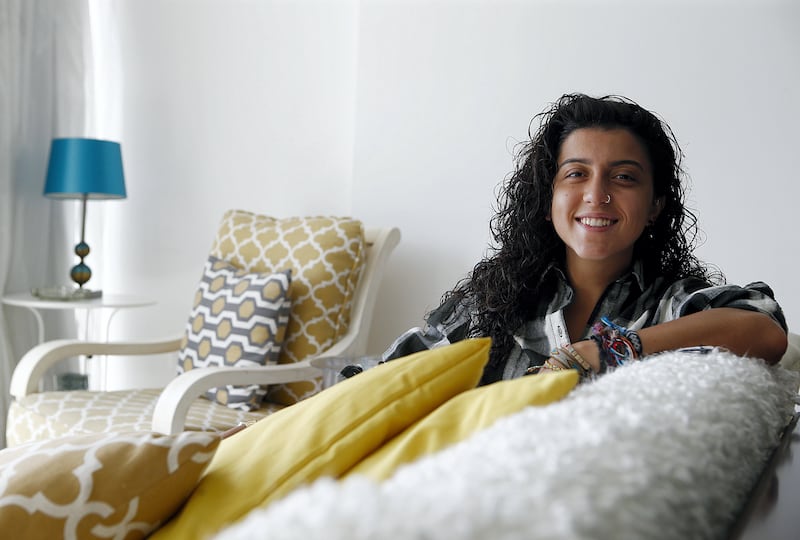Despite her age, Farah Chamma is already a veteran in the world of poetry and spoken-word performance. At 15, she joined The Poeticians, a group run by Hind Shoufani that hosts events for multilingual poets of all backgrounds in Dubai and Beirut. Then, while studying in Abu Dhabi, Chamma joined Dorian “Paul D” Rogers’ Rooftop Rhythms, a celebration of oral expression that brought slam poetry to the capital.
Today, she is an active member of Dubai Poetics, which was started by Jamil Adas two years ago as an online platform to publish poets’ work and have artists collaborate to illustrate the poetry. It has since become one of the city’s most prominent hubs for poetry sharing and art collaboration, and its events are held all across town to allow poets to perform. Dubai Poetics has also been hosting workshops, led by Chamma.
“Some people are so scared about being on stage or don’t know the difference between spoken and written poetry,” she says. “So many [people] in Dubai want to write and express themselves, but are so caught up with work, or tired or so frustrated, they just need an outlet. We can help.”
Dubai Poetics' next workshop is planned for September 9. The venue will be announced on dubaipoetics.com
Here are Chamma’s top five tips on how to create evocative spoken-word poetry:
1 You can never watch enough spoken-word poetry. Look online, look at performers; you will see stuff that will blow your mind. For example, look up Button Poetry on YouTube. And if you want to branch into spoken-word poetry in Arabic, search for performances by Terez Sliman (Palestine), Aly Talibab (Egypt), Mazen El Sayed known as El Rass (Lebanon) and Hani Al Sawah (Syria).
2 Body language is everything, so spend some time learning about it; learning about how to move in a space. What is natural for your body? How are you comfortable moving? We address this in our workshops, because it’s crucial.
3 Always think of your audience. Imagine them. Imagine you are sitting among your audience, watching yourself. What would you like to see? What would bore you? What would move you? With spoken-word poetry, you’re not just writing for yourself or for someone reading quietly in their living room. You are performing. Never forget that.
4 You need to find your own style; to know what you like to say and what you care about expressing. Audiences are bored of the drama and the same tired topics, the things that are all over the news. It’s no longer new. Ask different questions. Don’t feel like you just have to tackle the big causes. Sometimes, a simple love story will move so many people because it’s genuine and what people need to hear. Don’t underestimate your personal experiences.
5 When you are on stage, you’re in front of people, and they can sense how genuine you are; they can tell if you’re selling your work or marketing. We are all sick of that we need something more real and raw. When you go to a spoken-word poetry event, you want to be inspired, not hear what you already know. Think about that when you’re writing.
_________________
Read more:
[ Palestinian poet Farah Chamma on broadening her work’s scope ]
[ Literaturhaus at Nadi marks a Dubai salon revival ]
_________________





